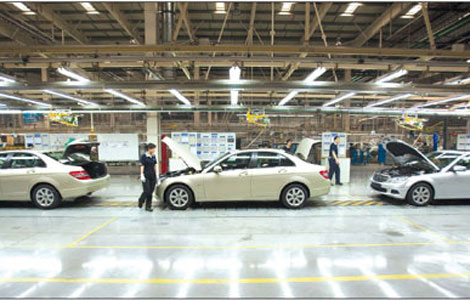Economy
HK pushes to become financial hub
Updated: 2011-03-16 11:22
By Ariel Tung (China Daily)
New York - Having spent most of his career in Asia, Simon Galpin, originally from the United Kingdom, feels perfectly at home in Hong Kong. These days, he enjoys persuading other foreigners to relocate to the city.
|
 |
|
Simon Galpin, director-general of InvestHK |
Galpin said InvestHK has assisted more than 1,600 foreign and Chinese mainland companies set up or expand in Hong Kong over the past nine years.
He and his team reach out to potential companies and provide information and advice. If a company decides Hong Kong is the right place for them, InvestHK assists the company in its transition to a new environment, for example in finding office locations and suitable schools for employees' children.
This year, Galpin is working to promote Hong Kong as China's global financial center as well as to attract companies that will bring green energy and renewable energy to Hong Kong.
Shanghai, no doubt, is a very important financial center, he said, but there is room for China to have more than one financial center. He lists Hong Kong's English-speaking business community and low taxes as benefits to starting businesses. There's very little complexity for entrepreneurs to grapple with when they first set up shop in Hong Kong, he said.
Hong Kong is also seen as an ideal place to serve as an offshore renminbi center for China and this will further promote its standing as a global financial center, he said.
Hong Kong's status as a financial hub and its close proximity to Southeast Asia will help create demand for RMB investment, said Jiang Shu, an analyst at Industrial Bank.
According to the annual "Doing Business" report by the World Bank, Singapore remains the world's easiest place to do business, followed by Hong Kong.
| ||||
"I think Hong Kong being part of China is a real advantage. Hong Kong is a great place for companies that are new to Asia to start off and also a great place to access opportunities on the mainland. At the same time, Hong Kong is the springboard for many mainland companies to go global," Galpin said.
Galpin cites recent moves of two senior executives to Hong Kong: General Electric Co Vice-Chairman John Rice and Caterpillar's Emerging Markets Chief Rich Lavin. In 2009, HSBC Holdings Plc moved CEO Michael Geoghegan to Hong Kong from London in its efforts to increase its focus on emerging markets.
In recent years, a number of Singaporean and Indian companies have set up or expanded their businesses in Hong Kong, many of them from the banking, transport and industrial sectors, Galpin said. However, the high cost of wages, rent and the cost of living in Hong Kong can be a deterrent to entrepreneurs.
According to a study by property consultancy DTZ, Hong Kong overtook London's West End last year as the world's most expensive place for office space rentals.
But Galpin said there is a range of cheaper options that even small companies can take advantage of.
"Hong Kong may be a very small economy, but you can easily find cheaper buildings within one to two blocks of those prestigious buildings. And if you are willing to go two or three blocks farther from the subway, the costs would be even lower," he explained.
Hong Kong, he said, is a fun place to live. Westerners will find that the cosmopolitan city has an array of schools, clubs and associations that expatriates can easily tap into.
"I think Hong Kong is a very accessible place for foreigners. It's very familiar. There are lots of choices, even though it's a small place. Expatriates can live very different lifestyles," said Galpin, who has lived in Hong Kong for 17 years.
E-paper

Factory fever
Despite auto manufacturing bubble scare, car giants gear up expansion of factories.
Preview of the coming issue
Dressed for success
Fabric of change
Specials

Earthquake Hits Japan
A massive 8.8 magnitude quake hit the northeast coast of Japan on March 11,2011.

NPC & CPPCC sessions
Lawmakers and political advisers gather in Beijing to discuss major issues.

Slide: Japan quake
Devastating earthquake and tsunami left millions without water, electricity, homes or heat.




